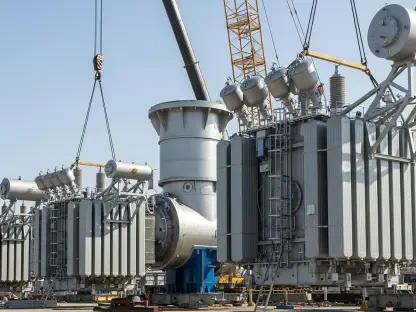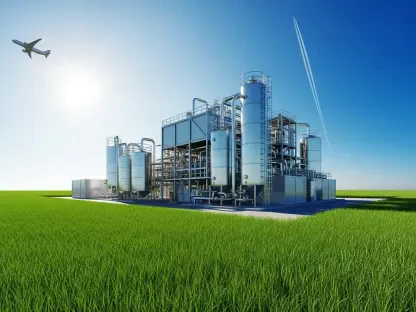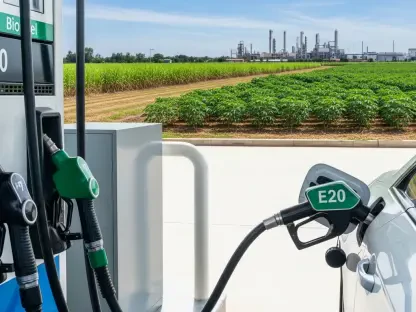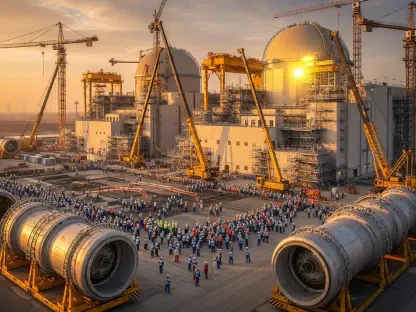The United Kingdom has reached a monumental moment in its energy history, officially shutting down its last coal-fired power plant. On September 30, 2024, Ratcliffe-on-Soar in Nottinghamshire ceased operations, signaling the end of an era and the dawn of a new age focused on renewable energy. This significant achievement makes the UK the first developed nation to completely phase out coal from its electricity generation mix, underlining its commitment to curbing carbon emissions and meeting environmental goals.
Historical Context of Coal in the UK
The Backbone of Industrial Development
For centuries, coal played a crucial role in the United Kingdom’s industrial and economic growth. Coal mines and power plants were once abundant across the country, propelling the Industrial Revolution and providing countless jobs. Key to this history was the Ratcliffe-on-Soar power station, which began operations in 1967. At its peak, the station could generate power for about 2 million homes, employing a workforce of up to 3,000 people. This made it a symbol of Britain’s era of industrial might. Coal was not just an energy source; it was the lifeblood of the nation’s economic engine. Across Britain, coal-powered locomotives and factories were a testament to technological progress, pushing the country to the forefront of global industrialization.
However, the enormous reliance on coal came at a cost. The environmental toll was significant, contributing to air pollution and greenhouse gas emissions. As industries grew, so did the environmental footprint. Despite these drawbacks, the economic benefits kept coal at the center of the UK’s energy strategy for many decades. The Ratcliffe-on-Soar station, in particular, exemplified this complex relationship, balancing industrial growth against environmental impact. The power station stood as a monument to an era that prioritized economic growth but began to reckon with its environmental consequences in recent decades.
A Gradual Decline
Since the early 2000s, the United Kingdom has systematically reduced its dependence on coal. This shift was driven by increasing awareness of coal’s environmental and health impacts. Policies and regulations became stricter, pushing for cleaner air and reduced carbon footprints. Stricter regulations targeted emissions, making it more challenging for coal plants to operate within legal limits. This regulatory push was coupled with rising public awareness and activism against pollution, which pressured the government and industries to seek greener alternatives.
Meanwhile, natural gas and renewable energy sources grew more economically viable and technologically advanced, leading to coal’s gradual decline. The cost of renewable technology plummeted, and new infrastructure investments made these options more feasible. Subsidies and incentives further tilted the scale in favor of solar, wind, and other renewable sources. As the market for clean energy grew, coal became less of an economic necessity and more of a liability. All these factors converged to make the gradual decline of coal not just possible but inevitable, setting the stage for a significant energy transition.
The Final Shutdown of Ratcliffe-on-Soar
Decommissioning Process
On September 30, 2024, Ratcliffe-on-Soar officially ceased operations, marking the United Kingdom’s definitive exit from coal-powered electricity. The decommissioning process is expected to take two years, including the safe dismantling of machinery and demolition of structures. This transition period is set to minimize any disruptions while safeguarding the local environment and community. The process will involve careful planning and execution to ensure that hazardous materials are appropriately managed and that the local area remains safe for future development.
Specialist teams will conduct detailed assessments to plan the plant’s safe and effective dismantling. Heavy machinery will be disassembled, buildings will be demolished, and the land will be restored to a state that allows for future use, potentially even as a site for renewable energy projects. The intricate logistics of such an operation highlight the challenges of ending an era of coal reliance, further emphasizing the significance of this milestone. Additionally, the decommissioning is not just about removing physical structures but also responsibly managing the plant’s environmental legacy to ensure no long-term harm.
Economic and Workforce Impact
The plant’s closure affects not only energy production but also the local economy and workforce. Over its 57-year lifespan, Ratcliffe-on-Soar was more than an energy provider; it was an employment hub. The shutdown represents a significant change for workers. The workforce, which once numbered up to 3,000, now faces a transition that calls for support and new opportunities. Strategies are in place to support these employees, offering retraining programs and new job opportunities within the renewable energy sector. The government and local authorities are collaborating to provide these programs aimed at reskilling workers for jobs in emerging industries.
Community impact programs are also being initiated to help the broader society adjust to this change. The aim is to provide economic stability while fostering an environment that supports sustainable development. Various initiatives include educational programs focused on renewable energy technologies and partnerships with private companies to create new employment opportunities. This holistic approach ensures that the transition from coal does not leave communities behind, instead offering them a pathway to a secure and sustainable future. In essence, the objective is to turn a potentially negative economic impact into a positive transformation for local economies and workers.
Transition to Renewable Energy
Expansion Plans for Solar and Wind Energy
As the coal era ends, the United Kingdom’s focus shifts to expanding its renewable energy capacity. Government plans include a substantial increase in solar power installations. Solar energy is expected to become a cornerstone of the UK’s energy mix, harnessing the latest advancements in photovoltaic technology. These advancements will make solar energy more efficient and cost-effective, providing a reliable and sustainable energy source. Parallelly, there is a strong push to resume onshore wind farm construction, deemed essential for meeting future energy demands. Onshore wind projects are seen as critical for balancing energy requirements, especially during peak demand periods.
The government has set ambitious targets for renewable energy contributions to the national grid, aiming for a significant percentage of all electricity to come from green sources within the next decade. This involves not only large-scale projects but also encouraging local and community-based renewable energy initiatives. Incentives for solar panel installations on homes and businesses, coupled with streamlined regulations, are expected to boost adoption rates. Overall, these plans represent a multi-faceted approach to transition from fossil fuels, with solar and wind energy playing key roles. The anticipated outcome is an energy landscape where renewables are the primary power source, reducing dependency on imports and enhancing energy security.
The Role of Energy Storage
One of the main challenges of switching to renewable energy sources is their intermittent nature. To address this, the United Kingdom is investing heavily in developing large-scale energy storage facilities. These will store excess energy generated during peak production times and release it when generation is low, thus ensuring a stable supply. Innovations in battery technology and other energy storage solutions are critical in this transitional phase. Advanced energy storage systems will allow the grid to balance supply and demand more effectively, reducing the need for backup power from fossil fuels. This capability is essential for maintaining grid stability and reliability as the share of renewables increases.
Significant investments are being made in research and development of next-generation batteries that offer longer life cycles, higher energy densities, and lower environmental impacts. Another focus is on developing smart grid technologies that can optimize energy distribution based on real-time data, ensuring the most efficient use of stored energy. Pilot projects are already testing these advanced storage solutions, and early results are promising. The integration of energy storage with renewable sources will create a more resilient and flexible energy system, capable of adapting to varying generation levels and consumer demands. This will be a crucial factor in making the transition to a renewable-focused energy sector both sustainable and effective.
Environmental Goals and Climate Policies
Commitment to Net-Zero Carbon Emissions
The United Kingdom has set an ambitious target of achieving net-zero carbon emissions by 2050. The closure of all coal plants is a pivotal step towards this goal. Reducing the carbon footprint of the energy sector is crucial for meeting international climate commitments and safeguarding the planet for future generations. This commitment involves not just eliminating coal-fired power but also ensuring that transition paths for other sectors, such as transportation and industrial manufacturing, align with these goals. The nation’s proactive approach sets a challenging yet necessary precedent for combating climate change on a global scale.
Policy initiatives and frameworks are being established to encourage industries and businesses to shift towards sustainable practices. Incentives for adopting cleaner technologies, penalties for polluting, and extensive public awareness campaigns are all part of this comprehensive approach. The public and private sectors are expected to collaborate closely to innovate and invest in solutions that minimize environmental impact while fostering economic growth. Overall, the UK’s commitment to net-zero emissions is a multi-pronged strategy designed to create a sustainable, low-carbon economy. The ambitious targets reflect the urgency and importance of addressing climate change and present a roadmap for long-term environmental sustainability.
Policy Frameworks and International Collaboration
The United Kingdom’s transition is supported by robust policy frameworks aimed at promoting clean energy and sustainability. Programs and incentives encourage investment in renewable technologies and energy-efficient infrastructure. These policies are designed to create a favorable environment for the growth of clean energy companies and to facilitate the widespread adoption of renewable energy solutions by individuals, businesses, and communities. Additionally, the UK is collaborating with other countries to share knowledge and strategies, fostering a global movement towards cleaner energy. International partnerships and knowledge exchanges are essential for scaling up solutions and ensuring that best practices are adopted worldwide.
Policy frameworks also include stringent reporting and accountability measures to ensure progress towards environmental goals. Regular assessments and transparent reporting mechanisms are in place to track advancements and adjust strategies as needed. Furthermore, these policies align with international climate agreements, underlining the UK’s commitment to global climate leadership. By participating in global initiatives and contributing to international climate funds, the UK not only advances its own sustainability goals but also supports efforts in developing nations. This collaborative approach amplifies the impact of the UK’s clean energy transition, reinforcing its role as a proactive player in the global fight against climate change.
Future Prospects and Innovations
Technological Advancements
The future of United Kingdom energy isn’t just about shifting sources; it’s also about embracing innovation. Emerging technologies, such as advanced grid management systems and artificial intelligence, are set to optimize energy distribution and consumption. These technologies will make the renewable energy grid more resilient and efficient, ensuring reliable power in a sustainable manner. Grid management systems will use real-time data and predictive analytics to balance energy loads, reduce wastage, and improve the overall efficiency of the energy infrastructure. Artificial intelligence will play a vital role in predictive maintenance, anomaly detection, and dynamic energy pricing models.
Innovation extends beyond grid management to other areas of the energy ecosystem. Advances in material science and engineering are leading to more efficient solar panels and wind turbines, while new storage technologies promise to address the intermittency challenge of renewables. Research into hydrogen as a clean fuel source is gaining momentum, offering potential solutions for sectors that are hard to electrify. Collectively, these technological advancements promise to accelerate the transition to a sustainable energy system, providing reliable power while minimizing environmental impact. The UK’s commitment to research and development in these areas highlights the importance of innovation in achieving long-term energy sustainability goals.
Economic Opportunities
The United Kingdom has seized the coal-free transition as an opportunity to revitalize its economy. The move attracts investments in green technologies and industries, providing a fertile ground for innovation and job creation. Economic policies supporting clean energy projects aim to create a robust market for renewables, making the country a global leader in sustainable technology. As green technology companies grow, new high-skilled jobs are emerging in sectors like engineering, construction, and research and development. This workforce shift is designed to ensure that the economic benefits of the transition are widely shared.
Furthermore, the UK’s clean energy leadership positions it as a key player in the global market for green technology. British companies are increasingly exporting expertise and technologies overseas, driving economic growth while contributing to international sustainability efforts. Conferences, partnerships, and trade missions are part of the strategy to solidify the UK’s status as a pioneer in green innovation. The anticipated economic opportunities from the renewable energy boom are expected to create a dynamic and resilient economy, aligned with both national and global environmental priorities. This forward-thinking approach ensures that the transition to a clean energy future not only addresses climate goals but also catalyzes long-term economic prosperity.









